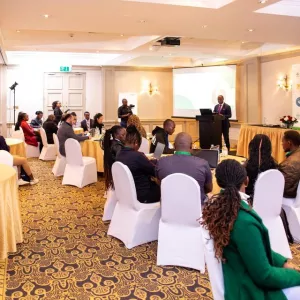Enhancing Agricultural Practices: Insights from the Impact of AICCRA’s Kenya Agri Hackathon on Post-Harvest Losses
Post-harvest losses pose a significant challenge to agriculture in Kenya, with statistics revealing their pervasive impact on various value chains. The Accelerating Impacts of CGIAR Climate Research for Africa (AICCRA) project, the Alliance of Bioversity and CIAT International (ABC), CGIAR Accelerate for Impact Platform (A4IP), in collaboration with The Rallying Cry, recently organized the launch of the Kenya Agri Hackathon

Enhancing Agricultural Practices: Insights from the Impact of AICCRA’s Kenya Agri Hackathon on Post-Harvest Losses
Post-harvest losses pose a significant challenge to agriculture in Kenya, with statistics revealing their pervasive impact on various value chains. The Accelerating Impacts of CGIAR Climate Research for Africa (AICCRA) project, the Alliance of Bioversity and CIAT International (ABC), CGIAR Accelerate for Impact Platform (A4IP), in collaboration with The Rallying Cry, recently organized the launch of the Kenya Agri Hackathon (Kenya AgriHack) on November 8th and 9th, 2023 in Nairobi, Kenya in response to this challenge. Emerging as an initiative from the Climate Smart Investment Plan (CSAIP) for Kenya, this event aimed to address the critical issue of post-harvest losses, particularly in cereals, horticulture, and dairy value chains.
The Challenge
The Climate-Smart Agriculture Investment Plan (CSAIP) for Kenya is a strategic plan designed to support both public and private investments towards nationally supported and scientifically screened climate priorities, with a specific focus on the implementation of innovations in climate-smart agriculture. Notably, post-harvest losses emerged as a significant challenge, especially in Kenya, where an estimated 40 percent of harvested crops are lost annually, leading to financial losses of up to USD 500 million (WFP, 2023). For instance, maize recorded a loss of 16.7 percent (African Post-Harvest Losses Information Systems – APHILIS), while dairy experienced a 4.5 percent loss (MoALF, 2013), and these losses surged to a staggering 50 percent in certain horticulture value chains.
Event Highlights
With over 130 applications received, the hackathon brought together 15 teams and 9 individuals, totaling 24 ideas. These innovators converged to develop solutions targeting post-harvest losses while integrating gender and climate-smart approaches into their innovations. In addition (6) entrepreneur support organisations (ESOs), (6) research Institutions, (3) policy makers and (10) other private sector stakeholders were present to support in design of solutions.

